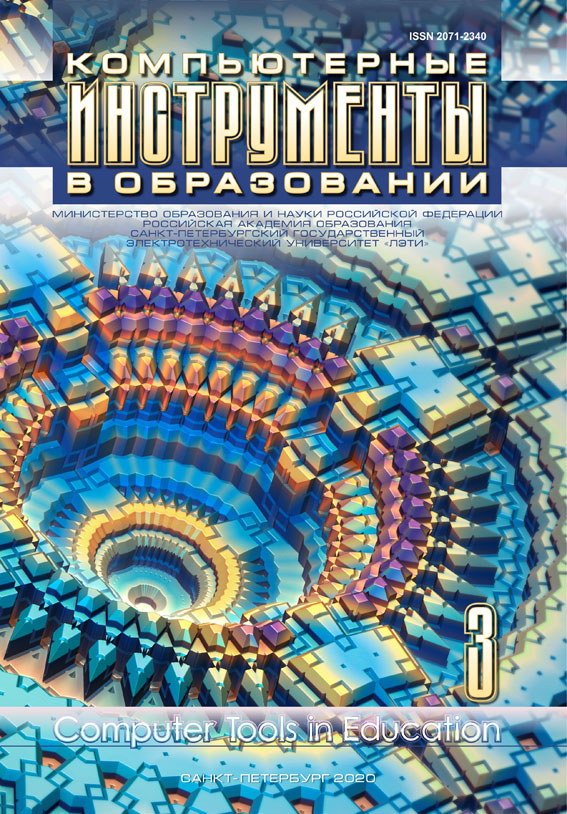Experience that should be not lost: distance education at universities in the context of the COVID-19 pandemic
Abstract
The article discusses a number of problems manifested during the sudden forced transition of educational institutions to the use \pagebreak of exclusively distance learning technologies in the context of the COVID-19 pandemic, and the specifics of these problems for the areas of higher education related to the use of information technologies. A feature of these fields is the preparedness of teachers and students to use modern information technologies, as well as the high motivation of students. Under the conditions of force majeure, when the necessary stage of designing distance learning and filling it with content was forcibly skipped, both general and specific problems in organizing the educational process arose. The article analyzes the results of surveys of teachers and students conducted by the authors, which made it possible to list these problems and identify their economic and organizational reasons.
References
V. V. Verzhbickij, V. G. Kinelev, V. S. Mes’kov, V. I. Ovsyannikov, and S. A. Shchennikov. Koncepciya sozdaniya i razvitiya edinoj sistemy distancionnogo obrazovaniya v Rossii [The concept of creating and developing a unified system of distance education in Russia], Moskow:Goskomvuz, 215 p., 1995 (in Russian).
A. V. Yurkov. Vvedenie v distancionnoe obrazovanie: ucheb. posobie [Introduction to distance education. Tutorial], SPb.: OCEiM, 35 p., 2005 (in Russian).
L. V. Gadasina, L. F. Vyunenko, I. E. Egorova, and A. V. Yurkov. Gotovy li VUZy k polnocennomu ispol’zovaniyu sredstv distancionnogo obucheniya v usloviyah fors–mazhora? [Are universities ready to the valuable applying of distance teaching technology in force majeure?] In Prepodavanie informacionnyh tekhnologij v Rossijskoj Federacii: materialy Vosemnadcatoj otkrytoj Vseross. konf. / Otv. red. Al’minderov A.V., Moscow, Russia, 2020, pp. 86–87 (in Russian).
S. V. Gorbatov, A. V. Dobud’ko, T. V. Dobud’ko, and O. I. Pugach, Organizacionno–tekhnologicheskie aspekty formirovaniya i razvitiya informacionno–obrazovatel’noj sredy sovremennogo VUZa [Organizational and technological aspects of the formation and development of a modern university information and educational environment], Baltic Humanitarian Journal, vol. 6, no. 4 (21), pp. 309–312, 2017 (in Russian).
M. Simonson, S. M. Zvacek, and S. Smaldino, Teaching and Learning at a Distance: Foundations of Distance Education 7th Edition. IAP, 361 p., 2019.
G. Rumble, The planning and management of distance education. Routledge, 262 p., 2019.
D. Keegan, Foundations of distance education (3rd ed.). London: Routledge, 224 p., 1996.
S. V. Bobryshov, L V. Sumenko, and O. A. Taran, Vozmozhnosti, riski i zadachi distancionnogo obrazovaniya v cifrovuyu epohu v obespechenii realizacii social’no–pedagogicheskih funkcij [Opportunities, risks and challenges of distance education in the digital age in ensuring the implementation of socio–pedagogical functions], In Luchshie praktiki «Vyzov cifroj» : materialy Vseros. nauch. konf. s mezhdunarodnym uchastiem / redkol.: R.I. Kirillova [i dr.], CHeboksary: ID «Sreda», 2020, pp. 13–19 (in Russian).
S. B. Eom and N. Ashill, “The determinants of students’ perceived learning outcomes and satisfaction in university online education: An update”, Decision Sciences Journal of Innovative Education, vol. 14, no. 2, pp. 185–215, 2016.
A. G. Gancheva, “Obuchenie po vreme na pandemiya — poziciyata na prepodavatelite (na primera na Plovdivski Universitet ’Paisij Hilendarski’)” [Education During A Global Pandemic – The Position Of The University Lectures (On The Example Of University Of Plovdiv Paisii Hilendarski)], Humanitarian Balkan Research, vol. 4, no. 2 (8), pp. 36–39, 2020 (in Bulgarian).
A. A. Lukyanovskij, G. A. Lucenko, and I. A. Shabalin Otnoshenie molodezhi k karantinnym meram vo vremya pandemii COVID–19 [The attitude of young people to quarantine measures during the COVID–19 pandemic], In Istoriya, politologiya, sociologiya, filosofiya: teoreticheskie i prakticheskie aspekty: sb. st. po mater. XXXII–XXXIII mezhdunar. nauch.–prakt. konf., Novosibirsk: SibAK, 2020, no. 5–6 (24), pp. 40–51 (in Russian).
Yu. E. Pletneva and G. N. Ochirova, Vliyanie pandemii COVID–19 na polozhenie inostrannyh studentov v Rossii [The impact of the COVID–19 pandemic on the status of foreign students in Russia] Scientific review. Series 1. Economics and law, no. 3, pp. 147–155, 2020 (in Russian); doi: 10.26653/2076–4650–2020–3–13.
M. L. Gruzdeva and N. I. Tukenova, Analiz sovremennogo sostoyaniya issledovanij i razrabotok v oblasti postroeniya informacionno–obrazovatel’nyh sred vysshih uchebnyh zavedenij [Analysis of the current state of research and development in the construction of information and educational environments of higher educational institutions], Vestnik of Minin University, vol. 7, no. 2 (27), pp. 1–14, 2019 (in Russian); doi: 10.26795/95/2307-1281-2019-7-2-1.
E. O. Gretinskaya, T’yutorstvo v Rossii kak novaya model’ obrazovaniya: stanovlenie i razvitie [Tutority in Russia as a new model of education: formation and development], Problemy sovremennoj nauki i obrazovaniya, no. 4 (34), pp. 134–138, 2015 (in Russian).
T. M. Kovaleva, E. A. Suhanova, and N. S. Gulius, Perekhod k t’yutorskoj modeli sovremennogo universiteta: predposylki, precedenty, zadachi upravleniya [The transition to modern university tutor model: prerequisites, precedents and management tasks], University Management: Practice and Analysis, vol. 21, no. 6 (112), pp. 101–113, 2017 (in Russian); doi: 10.15826/umpa.2017.06.079.
I. A. Nagaeva and M. Sh. Sayapov, Raschet trudozatrat prepodavatelej pri ispol’zovanii distancionnyh obrazovatel’nyh tekhnologij [Calculation of teacher’s labour expenditures at use of distant educational technologies], Economy. Law. Society, no. 3, pp. 100–106, 2015 (in Russian).
O. V. Sviridenko, V. Y. Kuznetsova, Y. A. Balueva, and E. V. Comerzan, Planirovanie i uchet uchebnoj raboty professorsko–prepodavatel’skogo sostava pri realizacii obrazovatel’nyh programm s primeneniem distancionnyh obrazovatel’nyh tekhnologij [Planning and accounting of academic work of the teaching staff in the implementation of educational programs using distance learning technologies], In Informatizaciya inzhenernogo obrazovaniya. INFORINO 2018: materialy IV Mezhdunarodnoj nauchno–prakticheskoj konferencii, Moscow, Russia, 2018, pp. 521–524 (in Russian)

This work is licensed under a Creative Commons Attribution 4.0 International License.







